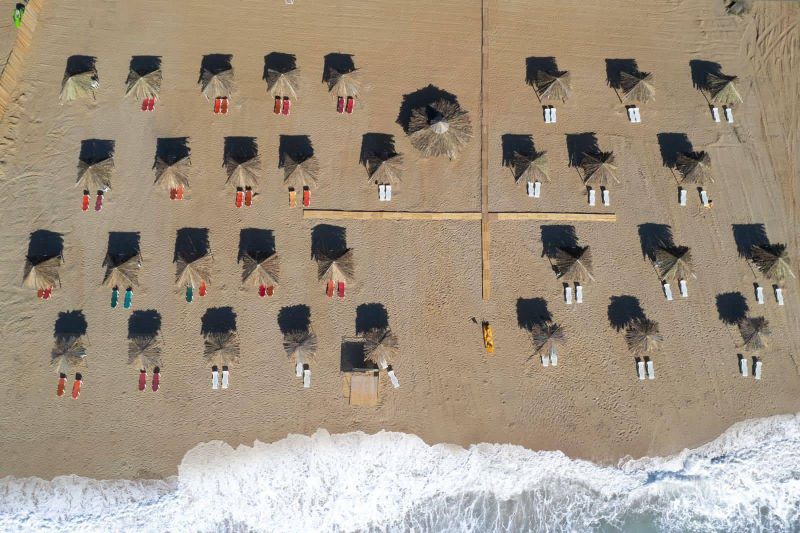
A private beach in Dammour, south of Beirut. (Credit: Mohammad Yassin/L'Orient-Le Jour)
Has spending a day at the beach become a luxury in Lebanon? While access to private seaside resorts is now within the reach of the dollarized, it is proving increasingly difficult for those who are paid in lira.
With prices ranging from $3 to $40 per ticket, access to the coast is even more unequal, as most beaches are privatized.
Many Lebanese, therefore, fall back on the few public beaches that are still untouched by investors and other state or private occupiers, and whose upkeep is not up to expectations.
In the north, where there are around 10 public beaches, entrance fees to private beaches range from $3, as at Sealena Beach in Heri right before Chekka, to $35, as at Butlers Beach Club in Batroun.
In the capital, rates can reach $40, such as at the 5-star Kempinski Hotel. The Sporting Club Beach offers a more affordable rate, which is $25 on the weekends, but this may soon increase, according to an employee.
At the invitation-only Automobile et Touring Club du Liban (ATCL), in Kaslik in Kesrouan, entrance fees are $6 during the week and $10 on the weekends.
In the South, where about six beaches are open to the public, prices start at $10 in private resorts and sometimes reach $20.
This difference is explained by the facilities — bars, bungalows, jacuzzis — or DJ entertainment offered to customers.
Jean Beyrouthi, president of the Syndicate of Owners of Beach and Seaside Resorts, told L’Orient-Le Jour that beach entrance rates increased “by around 15-20 percent” in dollars at market rates compared with last summer.
This is due to the dollarization of employee salaries, food and Électricité du Liban (EDL) rates. In his opinion, this is a “step in the right direction” in order to boost the economy, especially as “the profit made by tourism establishments today is only around 40 percent of that before 2018.”
This trend also seems justified by professionals in the tourism and restaurant industry, which was the first to be allowed to display its prices in dollars, before the summer of 2022.
On Friday, Tony Ramy, the head of the Syndicate of Owners of Restaurants, Cafes, Nightclubs and Patisseries also defended the prices charged by the industry, saying in a public statement on Friday that they have not become too high as some of the people believe.
‘Unacceptable’
Not all beachgoers agree with the rate hike.
“I can no longer afford to go to the beach regularly with my family since the start of the economic crisis. It would cost me a fortune,” said Karim, 42.
“Last weekend, I paid just over $100 to spend the day and have lunch with my wife and our two children at a beach in the South. This is the equivalent of one-third of my salary. This is unacceptable!” said the civil servant, who is paid in Lebanese lira.
Ziad*, in his 30s, opted for a more affordable option in the North, but disputes another problem. “I paid LL500,000 to access Oasis Beach in Kfar Abida, or the equivalent of around $5. Compared with other beaches, the rate is still affordable, and you can use the showers, toilets, a sunshade and sun loungers, and bring food without being searched at the entrance,” he said.
“Despite all this, the beach complex has theoretically no right to have bathers pay an entrance fee, given that it is a public beach,” he said.
Preferential rates
Some resorts also offer preferential rates for women, whether for entrance or membership. For example, at Janna-sur-Mer in Damour, women under the age of 35 benefit from a reduced entrance rate on Fridays. They pay $8 instead of $14.
“We’ve always put this offer in place,” said an employee of Janna-sur-mer.
Beirut’s 5-star Riviera Hotel follows the same approach. The entrance fee before 11 a.m. is $12 for women on the weekend, compared with $25 for men.
Saint-Georges Hotel in Beirut introduced different entry fees according to the gender and age of bathers.
“The fact that prices are lower for women is a marketing strategy based on demand from our clientele. And we also wanted to encourage students to subscribe with us,” said Antoine Daher, the hotel’s general manager.
“It’s a promotional tool, and the offers are generally tailored to the establishment’s target customers. For example, when the customer is a woman, she generally comes with her family, her children or her boyfriend, so it’s a great way of bringing in people or publicizing a newly-opened establishment. In some resorts, there’s an entrance fee for children, for example,” said Beyrouthi.
*The first name has been changed at the request of the person concerned.
This article was originally published in French in L'Orient-Le Jour. Translation by Joelle El Khoury.